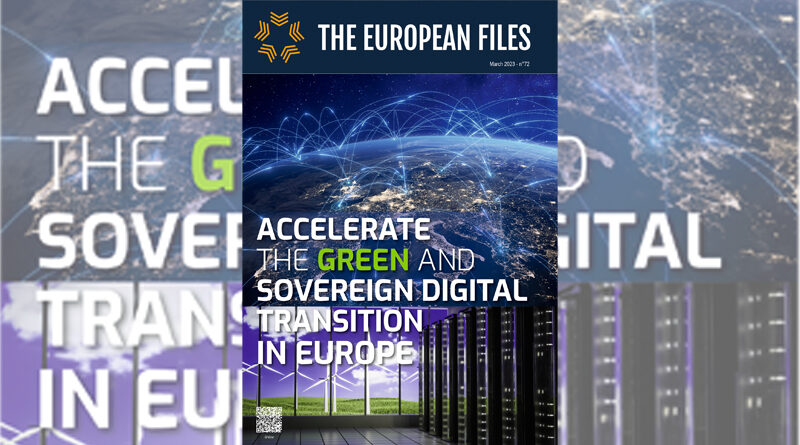
Accelerate the green and sovereign digital transition in Europe
The European Commission recalls that “the EU must work towards a safe, secure, sustainable and citizen-centric digital transformation, in line with the EU’s fundamental values and rights”.
We must recognize that the EU has lagged behind in digital technology for several years due to lack of investment and research, especially when compared to China and the United States. To stem this tendency, Europe has defined digital ambitions for the next decade in the form of clear and concrete objectives.
Digital Decade Policy Programme (DDPP), NextGenerationEU and Recovery and Resilience Facility the work on sustainable digital infrastructure, are programs which will help in the deployment of digital innovations in Europe.
The main areas of action for these programs are cloud computing, artificial intelligence, digital identities, data, and connectivity. At the same time we need to consider exploiting opportunities that the green transition offers to the digital sector.
Our companies have reached a tipping point to shape Europe’s digital future. We can reap the benefits of the dual transition provided that we have the right digital infrastructure and governance in place.
Another important point is the Digital Services Act (DSA), the Digital Markets Act (DMA) the two major pieces of legislation to regulate the online environment, will ensure better democratic and economic regulation of online platforms.
Ensuring a level playing field will also help the companies in sectors key to EU sovereignty to not suffer from unfair competition. European standards play a key role in this regard. As recognized in the new European standardization strategy, these are tools which improve security, ensure interoperability, support climate neutrality and build confidence in emerging technologies. This is why developing the standards of the future for the European data economy is essential to achieve a sustainable, digital and resilient Europe!
It is no secret that data is now a key pillar of Europe’s digital economy and will be the key to future innovation and economic growth. Facilitating data sharing within the EU and across sectors by strengthening data mechanisms with the use of artificial intelligence will foster the confidence of an agile data ecosystem. This is what the data act will enable and will drive competitiveness and economic growth in the EU.
The importance of data cooperation is to overcome barriers to data sharing between different actors and sectors. To do this we need to strengthen the European resilience of these infrastructures to cyber attacks. The European Union must develop “cybersecurity standards” to secure supply chains and consumer data privacy.
AI can help us optimize energy consumption, make transportation systems more efficient, improve manufacturing processes, and will help oversee the resilience of chains while developing legality, ethics, and robustness in the face of cybersecurity and other risks
We must digitize the end-to-end energy ecosystem, making it greener, smarter and more efficient. In this respect, public procurement rules are a major lever for innovation and autonomy.
Digital innovation is one of the keys to tackling Europe’s energy and climate crisis. By combining our assets and our strengths in ambitious programs, in the service of innovation ecosystems and in an ecological planning approach, we are giving Europe the means to fully play its role as a sovereign digital superpower in order to set up a fully operational digital single market by 2030.
Editor-in-Chief
Laurent ULMANN
- It is necessary for Europe to ensure the conditions of its sovereignty and its strategic autonomy
, French Minister for Digital transition and Telecommunications - Sovereign digital solutions should become a key element of the EU technological autonomy
- A strong digital Europe, that leads global markets by the power of example
, Romanian Minister of Research, Innovation and Digitalisation - The next round of European integration hinges on our ability to do GovTech together. It will not be easy.
, Undersecretary for Digital Transformation | Government CIO Ministry of Economic Affairs, Estonia - Twin transition as a driving force for a fair and prosperous future
, Director General, DG CONNECT, European Commission - Electricity 4.0: When electric meets digital
, Executive Vice-President Europe Operations, Schneider Electric - THE DATA ACT: Utilizing Europe’s industrial data
, MEP (EPP Group), Member of the ITRE Committee, Chair of the European Internet Forum (EIF) - Circular Economy in the ICT sector: Call for a more comprehensive European approach
, CEO Orange group - The window for a digital green energy transition is now, and we cannot miss it
, MEP (EPP Group – Denmark), ITRE Committee Member - Time to wake up! Europe cloud infrastructures must not be monopolised by a couple of software
, Former Director General for Trade and then Environment, EU Commission - Carbon footprint of the public sector: to reduce, it is necessary to count well
, Vice President, Head of EMEA South, Global Government Affairs, SAP - How the energy crisis laid bare Europe’s technology deficit
, Director-General of DIGITALEUROPE - AGENDA: Promoting data cooperation to enhance access to and use of sustainability data
, (S&D Group- Finland), INTRE Member , rapporteur for the data strategy initiative report - Europe needs flourishing industrial data markets – the Data Act could help us get there
, Co-founder and MEP of Volt. He is the Greens / EFA’s chief negotiator for the ‘Data Act’. - The role of standardization in supporting Europe’s digital transition –
, Director General of CEN and CENELEC - The implementation of regulation in the digital space, an ambitious new model for Europe
, MEP (Renew Europe Group – France), ECON Committee Member - Building a European ecosystem of federated cloud and data spaces
, Gaia-X CEO - Can data spaces support sustainability in manufacturing?
, Chief Expert Software, Siemens AG. - Deployment of Artificial Intelligence is key to European competitiveness
, MEP (EPP Group), Member of the ITRE Committee - Europe as a world leader in AI accepted by citizens and consumers
, Is a German Member of the European Parliament focussing on artificial intelligence legislation and other digital files. He is the EPP coordinator JURI Committee and Substitute Member LIBE committee. He follows the AI Act as EPP rapporteur in both committees. - How do we ensure the cybersecurity of the EU digital infrastructures and economy?
, Executive Director of ENISA



